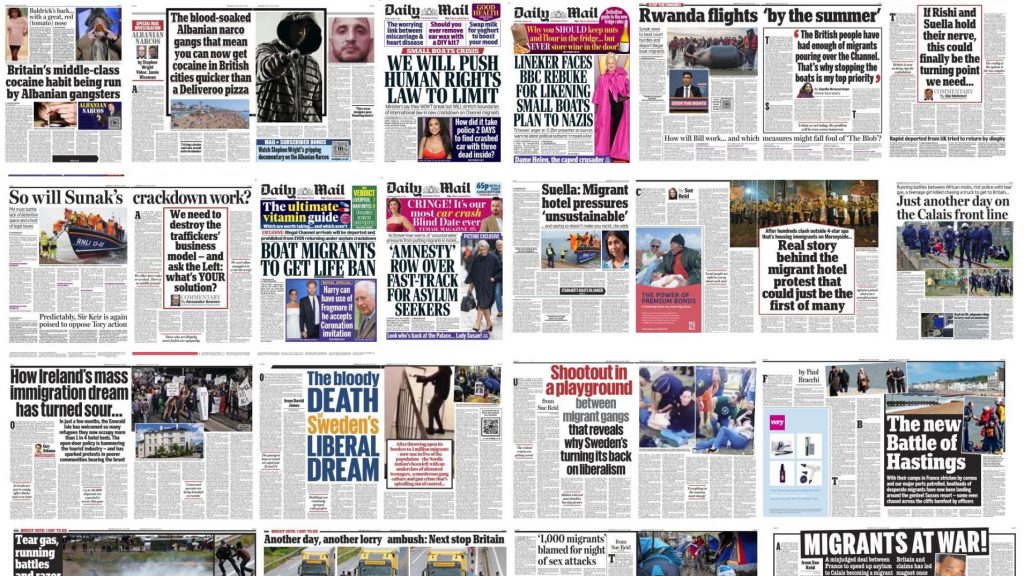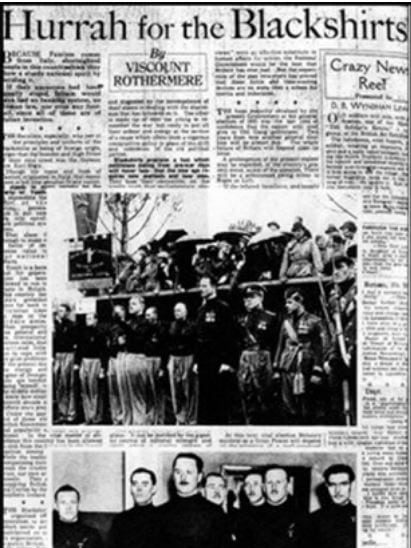Daily Hate: The Mail’s century-long quest to demonise migrants
It is arguably Britain’s most influential paper – which makes its long and ongoing history of vilifying refugees and asylum seekers even more troubling
The New European

At first, it was the Jews – “Russian Jews, Polish Jews, German Jews, Peruvian Jews; all kinds of Jews, all manner of Jews”. Now it is the Albanians. In between, there were Austrians, Poles, Italians, West Indians, Somalis, Chinese, Irish, Sri Lankans, Kosovans, Bangladeshis, Eritreans, Sudanese, Poles (again), Romanians, Bulgarians, Afghans and Syrians (I’ve doubtless missed a few). All coming here without legitimate reason to benefit from the Great British way of life, take our jobs, sponge off our welfare state and mug, rape and murder our citizens.
Such has been the history of refugees/asylum seekers/migrants as viewed by the Daily Mail over the past 120-odd years. As Prof Tony Kushner of Southampton University’s Parkes Institute put it more than 20 years ago: “The Daily Mail has been an anti-alien newspaper since the 1900s. There’s great continuity.” The nomenclature has changed (instead of “undesirable aliens” and “bogus asylum seekers” we now have “illegal migrants”), as has the provenance of those so-called, but the attitude has not: Britain is a generous host to the “deserving” displaced, but is regarded as a soft touch by those deemed not to warrant our hospitality.
That “Daily Mail special” report of a post-Boer war evacuation from February 3 1900 was headlined “So-called refugees” and began: “There landed yesterday at Southampton from the transport Cheshire over 600 so-called refugees, their passage having been paid out of the Lord Mayor’s Fund; and, upon the unanimous testimony of the ship’s officers, there was scarce 100 of them that had, by right, deserved such help, and these were the Englishmen of the party. The rest were Jews. The ship seemed alive with them.” It went on to describe in shocked tones the jostling, greedy, ill-mannered, foul-mouthed passengers.
The paper would never publish anything like that about Jewish people today – rather it accuses Jeremy Corbyn and Labour of antisemitism and Gary Lineker of insulting victims of the Holocaust – but it has used similar language this century in reporting “running battles” involving “mobs” of migrants (“Africans”, “Eritreans”, “Sudanese”, “Syrians”) “desperate to get to Britain” from the “squalid camp” in Calais – including two spreads on the day before the Brexit referendum. It is equally at home reporting similar disturbances in Germany, Sweden and elsewhere, with the incomers always the problem, rather than the often right wing locals going after them.

So it was in February after a Knowsley hotel accommodating asylum seekers was besieged by protesters. Unlike other papers, the Mail did not report the disturbances at the time, but it sent Sue Reid to investigate 10 days later. She identified the spark point as an Egyptian man accosting a 15-year-old girl and asking for her phone number, an incident filmed and shared on social media.
The ensuing protests, she continued, involved disgruntled locals, “pro-migrant groups” including “activists” from the Care4Calais charity, and members of the Communist Party. Late in the story, she said that left wingers, including the Guardian, had accused the far right of fomenting the disorder, but she declined to endorse or investigate the claim. She did, however, say that the far right Patriotic Alternative had set its sights on Skegness, where migrants and refugees had also been accommodated in hotels.
High in the piece, Reid reported that “ordinary” mothers, fathers and grandparents feared that the influx of young men posed a threat to their children, claiming they were “making a nuisance of themselves, chasing girls, hanging around in parks and abusing Britain’s generous hospitality”.

It is, of course, natural for people to be concerned when a large number of strangers are imposed on their community, but one of the reasons this is happening is that the bureaucracy of processing applications (not people) isn’t working. This is not the asylum seekers’ fault. It is quite legitimate for a reporter such as Reid to examine the impact on local life, but the Mail shows scant, if any, interest in talking to the people waiting for their fates to be decided. Rather, Reid was happy to suggest that it was unreasonable for destitute people whose “home” is a hotel room and who are forbidden to work – as asylum seekers are – to spend their time “hanging around” in parks. Isn’t that the most obvious thing for them to do? It’s free.
Four months earlier, Reid reported on a “playground shootout” between migrant gangs that explained “why Sweden is turning its back on liberalism”, and on the day after the Knowsley riot, David Jones produced a spread on “The bloody death of Sweden’s liberal dream”. The following week Guy Adams investigated “How Ireland’s mass immigration dream has turned sour”. You might say there’s a theme here.
It doesn’t have to be this way. Early in 2016, a Reid report was instrumental in convincing her paper that Britain should rescue lone children from the Calais Jungle. The Mail put pressure on then-prime minister David Cameron, who had previously ruled out accepting 3,000 migrants, and was soon splashing on its “Victory for compassion”. (Eventually, though, Theresa May’s government abandoned the scheme and the Mail forgot its campaign, reporting the decision at the foot of page 6.)
The Mail presents itself as being in tune with public sentiment, and it seems it was at the time of that Cheshire report in 1900, since a public backlash against the arrival of up to 150,000 of 2.5 million Jews fleeing pogroms in eastern Europe led to the 1905 Aliens Act, which pulled down the shutters. Today it thinks it is again reflecting the views of the “British people” in demanding action to “control our borders” and “stop the boats”, and in chiding Sir Keir Starmer for not supporting the Illegal Migration bill that will deny anyone arriving here by unconventional means the right to put their case for sanctuary.
Whether it is right this time is open to debate. The latest Ipsos survey of “issues that matter” to voters had immigration fifth on the list – behind the economy, the cost of living and the NHS – being mentioned by only 12% of those interviewed (down from 13% the previous month). People were more concerned about a lack of faith in politicians.

If passed, the Illegal Migration bill will be the 166th adjustment to the laws relating to immigrants since the Conservatives took office in 2010, quite apart from more than 40 initiatives designed to stop the small boats since 2019. These, as documented by the Guardian, include multiple attempts to “work with France”, using border force ships, jet skis and the navy to send the boats back, lining up third countries to take their unwanted passengers, buying ads on Facebook and banning social media posts “glamourising the crossings”.
Most, if not all, of these have been enthusiastically supported by the Mail (and the Sun, Express and Telegraph), which seemed almost to see it as a badge of honour that the latest effort would “push human rights law to the limit”. There have been frequent “this is the turning point” headlines and guest columns by the minister in charge.
Eleven months ago, Priti Patel wrote that anyone could see the asylum system was broken but her New Plan for Immigration, including sending people to Rwanda, would provide a firm but fair system to meet the people’s priorities. More recently Suella Braverman – who took journalists from favoured outlets, including the Mail and GB News, on a misfiring photo-opportunity trip to Rwanda – was the byline-of-the-moment, along with the headline “The British people have had enough of migrants pouring over the Channel. That’s why stopping the small boats is my top priority.” In this piece, she expanded on her Commons statement that “100 million people could qualify for asylum – and let’s be clear, they are coming here” to add that, on top of the 100 million, there were “likely billions more eager to come here if possible”.
Fact-checking ministers’ pronouncements is not always a priority for the Mail – nor is contextualising. So it did not point out that while there are 100 million displaced people around the world, about half of them are in their own countries and showing no desire to move abroad; nor did it question where the “likely billions” notion came from. Nor did it tell readers that “generous” Britain stands 18th when included in a league table of EU+ countries (the 27 plus Switzerland and Norway), in taking in refugees, at nine per 10,000 population, against an EU average of 14.
Or that we aren’t the automatic country of choice. According to the UNHCR, 44,190 people sought asylum here in the year to September 2022, 8% of the total number of applications to the EU+ and the UK. Germany had 127,730 applications and France 95,510. And all of these numbers are dwarfed by Turkey, whose population of 80-odd million includes nearly 4 million refugees. In November last year, 231,597 refugees lived in our islands, whose total population is 67.5 million.

The Mail did, however, report that the number of asylum seekers awaiting a decision had reached 166,000 and, indeed, that when cases are considered, three-quarters of applicants are allowed to stay. It keeps a tally on the thousands of people landing in small boats, but puts them in the context of the total number of people heading to the country only when official migration statistics are published. As Gary Lineker so controversially tweeted, there is no “huge influx”. A million people came to live in the UK in the year to last June (and half a million left), while in 2022, just under 46,000 arrived in small boats. And the government has recently admitted that there is no evidence to support an assertion by Patel that “70% of individuals on small boats are single men who are effectively economic migrants”.
Nor is the Mail interested in the individuals making that dangerous crossing. It focuses on Albanians – it recently ran a “special” on the Albanian drugs mafia feeding our “middle-class cocaine habit” – and looks away from the Afghans and Syrians desperate to escape the Taliban or Bashar al-Assad’s regime.
The Imix organisation tries to tell these people’s stories – to “give voice to the scapegoats” – by working with the media, but it reaches only the usual suspects: the Guardian, Independent and Metro, “never the Mail, Sun or Telegraph”. The Express, however, did approach it after seeing readers’ response to the Ukraine exodus, setting up its own help scheme before the official one was up and running.
Does any of this matter? Aren’t newspapers a dying commodity? Yes, but their output not only sets the news agenda for broadcasters, and influences politicians, but also is shared widely on social media – Imix’s chief executive, Jenni Regan, cites research showing that the Mail is the top content provider thrown up by searches for “migrants”.
Kushner at Southampton University, who thinks the Sun is worse than the Mail on this, says: “The Mail has been not totally hostile to Ukrainian refugees – white, European, Christian – as against those who come from the developing world who are non-white, often Muslim and therefore not ‘civilised’. Yet even with the Ukrainians, they seem keen to highlight the problems that have inevitably happened with a scheme that was pretty much unregulated.
“What has changed is the context: in the 1900s it was pro-empire and trying to attract a lower middle-class/upper working-class, newly literate audience to tell them what to think about the nation. The context now is post-imperial, post-EU, and the insular nationalism that has emerged. In both cases the alien ‘other’ can be blamed for all sorts of real problems, but not ones that the newcomers have caused.”
A report last autumn by the campaign group Stop Funding Hate (SFH) welcomed a reduction in “vitriolic and unequivocally hateful” coverage of migration and a significant reduction in international alarm at our press compared with the Brexit referendum period. But it still warned that “subtle” anti-migrant narratives, such as linking migrants to child abuse and crime, and the use of words such as “surge”, could have a greater impact on public perceptions than the “more obviously problematic” headlines. The cumulative effect was to give readers “permission” to hold or act on prejudiced views. Its founder, Richard Wilson, also pointed to the arrival of GB News. Its audience might be small, but the press amplified its messages and the channel was “retoxifying” public discourse.
Another campaign group, Hope Not Hate, has meanwhile highlighted what it sees as a growing symmetry between mainstream politicians and newspapers, with their “anti-woke agenda”, and the far right in focusing on the same issues and using the same “divisive narrative” in phrases such as “invasion” and “activist lawyers”. In a report last month, entitled “State of hate 2023: Rhetoric, racism and resentment”, it said: “While the organised far right is the most committed and vocal when it comes to the issue of cross-Channel migration and asylum-seeker accommodation, its position and even its rhetoric have been dangerously mirrored by the mainstream.”
Many people, it says, are angry, scared, detached and disillusioned as well as increasingly poor, a “dangerous mix” that it thinks the far right is seeking to exploit. “The danger of this potent mixture of far right agitation and local anger, fostered by irresponsible behaviour from mainstream politicians and some journalists” was, it continues, made plain by the petrol-bomb attack on an asylum centre in Dover last October, and the recent disturbances in Knowsley.
These were at least reported (eventually, in the case of Knowsley) across the press. But these incidents are becoming more common. Hope Not Hate logged 253 activist “visits” to accommodation housing immigrants and asylum seekers last year – twice as many as the previous year.
As Kushner notes, the Mail has become the shorthand for the entire right wing press because of its circulation, its influence with politicians – “both Tories and Labour being frightened of it or what it says” – and its infamous flirtation with fascism in the 1930s. Indeed, the Sun and Telegraph and, to a lesser extent, the Express and Times are saying much the same thing, giving “Suella” a platform and a microphone while trying to silence critics.
Remember, Braverman was confronted to her face about her use of the word “invasion” by an actual Holocaust survivor, and refused to apologise. Yet she demanded that Lineker say sorry over his language likening her rhetoric to 1930s Germany. The logical extension of that is that the Holocaust survivor should have been the one to apologise to Braverman, not the other way around.

If politicians and their newspaper supporters cared about the people on those boats, it would be one thing. But they don’t. They talk about stopping the traffickers who put them in peril; but that is window dressing. The real objective is not to stop the trade in misery, but to stop the poor souls who are paying the ferrymen.
There’s an irony to this. The big complaint is that the people on the boats are overwhelmingly young men. We have an ageing population and an acute labour shortage; the government is trying to entice young parents and the over-50s back to the workplace. The Mail rails about seven million “idlers” who got a taste for a life of leisure during the pandemic.
We need people to work and pay taxes, yet we are busting a gut to exclude healthy young people willing to do both without needing education or hip replacements. Isn’t it worth finding out who some of these people are and what they have to offer? Of course not. They are all criminals. Let’s put on the blinkers and send them somewhere else.
Liz Gerard is a former Times executive who now writes about print journalism. Her book Trussed Up, about the Mail and the Tory leadership, published by Bite-Sized Books, is available from Amazon
No comments:
Post a Comment